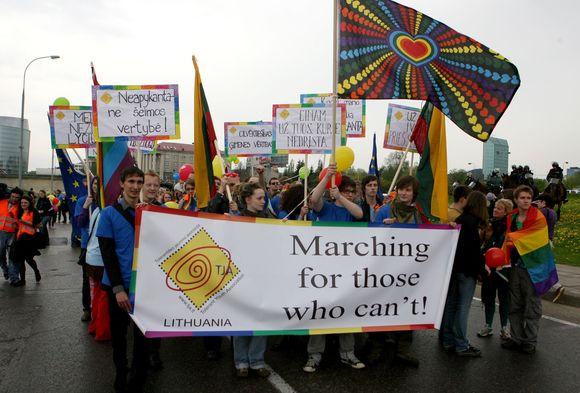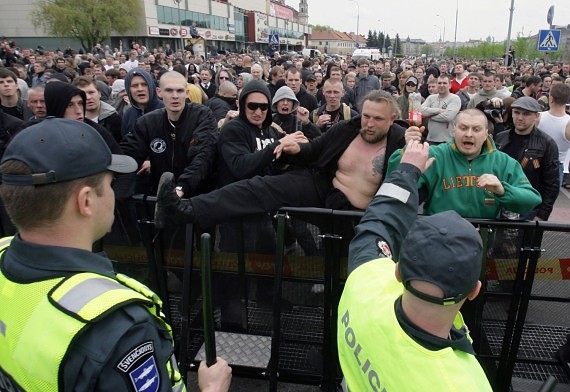 This year’s largest gay political event in the Baltics, the festival “Baltic Pride” parade took place near the Neris river in Vilnius on 8 May.
This year’s largest gay political event in the Baltics, the festival “Baltic Pride” parade took place near the Neris river in Vilnius on 8 May.
In a number of countries, including Europe, the right to organize gay parades is not matter-of-course. Neither the right to get a new legal gender identity.
Transsexual also risk being subjected to discrimination and harassment, both because of ignorance and norms related to traditional gender role patterns.
Lithuania is the worst
“The situation for the transsexual is difficult. The organizations lack visible and active people,” says Evita Gosa from the Latvian organization Mozaika.
She believes that lesbians, gays, bisexuals and the transsexual generally have best conditions in Estonia and the worst in Lithuania.
The main problem is lack of legislation regulating the change of gender identity and right to treatment. A woman-to-male transgender person brought his case before the court after being refused a new legal gender identity as a man.
The European Union Agency for Fundamental Rights (FRA) says it is uncertain whether Lithuania and Estonia have a real protection against discrimination of the transsexual. According to FRA, negative attitudes towards the transsexual are far more common in these countries than against lesbians, gays and bisexuals.
countries than against lesbians, gays and bisexuals.
Difficult to change the gender on paper
FRA reports that Latvia lacks good laws on legal change of sex. This leads to an unsafe situation for the transsexual.
“Change of a name is done administratively. Often transsexual gets only the changed gender-specific extension of the old first name. This leads in some cases to rare and stigmatizing name. After another bureaucratic procedure transsexual can get a first name he or she really wants but must additionally pay to get the permission,” said Evita Gosa.
In Estonia, there are laws that regulate the trans-gender theme, but certain medical requirements must be met before one can get a new name and new official gender status.
Then one can obtain new birth certificates and new passports. In Lithuania the proposed law on sex (2003) has not yet been adopted. In this void people can not legally change sex, since it is impossible to change the gender-specific personal code. A transgender person brought his case to European Court of Human Rights in Strasbourg against Lithuania. In 2007 the country was convicted of violations of the right to privacy.
Broad coalition needed
Council of Europe has  recently adopted the basic policy on the rights of lesbians, gays, bisexuals and the transsexual, i.e. LGBT-people (Lesbian, Gay, Bisexual, Transgender). The Council emphasizes the connection between basic human rights and discrimination against people because of their sexual orientation, gender expression and gender identity.
recently adopted the basic policy on the rights of lesbians, gays, bisexuals and the transsexual, i.e. LGBT-people (Lesbian, Gay, Bisexual, Transgender). The Council emphasizes the connection between basic human rights and discrimination against people because of their sexual orientation, gender expression and gender identity.
Access to regular health care is also important, since the transsexual frequently experience prejudice in the face of healthcare professionals.
“It is important that the broad alliance of human rights organizations engage in defending rights of gays and the transsexuals,” he said.
HRH Bergen, based on Amnesty International Norway information.
Related links:
Belarus: Gay pride march dispersed, participants arrested and fined


